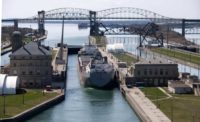Water Infrastructure
House Passes $25B Water Resources Development Bill
Similar bill awaits Senate floor action

Committee Chair DeFazio says keeping to biennial WRDA cycle is important. Credit: Courtesy of House Transportation and Infrastructure Committee
A key federal infrastructure bill advanced with approval in the House of a measure providing $25.3 billion to help finance 22 Army Corps of Engineers storm and flood protection, ecological restoration, harbor dredging and other projects around the country.
The House passed the bill, The Water Resources and Development Act, or WRDA, on June 8 by a strong, bipartisan 384-37 vote.
The $25.3 billion in federal funds, which would go to 18 new Corps projects and four project modifications, would be supplemented by nonfederal dollars. The total cost of the 22 projects, according to ENR's calculation, is an estimated $39.9 billion.
The next step for the legislation would be floor action in the Senate. That chamber’s Environment and Public Works Committee on May 4 approved a bill that is similar to the House version.
The Senate panel's proposal would authorize funds for 21 Corps construction projects.
The Senate committee cleared its WRDA by a bipartisan 20-0 vote. That unanimous tally bodes well for the outcome on the floor.
Lawmakers in the House and Senate are aiming to complete a new WRDA by the end of 2022. That would continue the recent pattern of enacting a WRDA every two years.
House Transportation and Infrastructure Committee Chair Peter DeFazio (D-Ore.), the WRDA bill's sponsor, speaking on the floor on June 7, said, "The two-year cycle is critical to addressing future water resource needs of our nation."
DeFazio noted that, if the new WRDA is enacted this year, it would be the fifth such measure to become law since 2014.
The core of the House measure, as with past WRDAs, is its construction project authorizations. "When it comes right down to it, this bill is a projects bill," said Rep. Sam Graves (Mo.), the Transportation and Infrastructure Committee's top Republican.
Graves noted that the WRDA measure was based on requests for projects and other provisions from House members from both parties and all regions.
'Must-Pass' Coastal Texas Project
By far the House bill’s largest construction project allocation is $19.2 billion for a combination flood protection and ecosystem restoration plans on the Texas coast. Nonfederal funding would bring the megaproject's total cost to $31.1 billion.
Rep. Brian Babin (R-Texas) called the Texas coastal plan a "must-do project" and "a major priority for southeast Texas."
Babin added that the project would provide millions of residents protection from hurricane storm surge and flooding. The project would also protect energy production facilities in the area.
The Senate committee version also includes the Coastal Texas project.
Other large authorizations in both bills include $1.5 billion for flood protection in the Florida Keys and $1 billion for a hurricane and storm protection project in Louisiana’s Upper Barataria Basin.
Besides the construction project authorizations, the House bill builds up the potential Corps pre-construction pipeline. DeFazio said the measure authorizes 72 new feasibility studies and instructs the Corps to speed completion of 14 studies that are already in the works.



